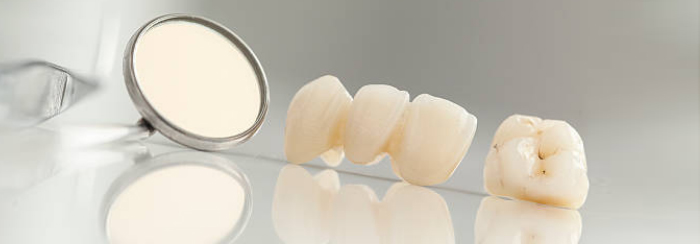Five Key Questions to Ask Your Dentist During Your Tooth Crown Consultation
It’s best to be well-informed about the procedure and purpose of a dental crown before booking your appointment.

When it comes to restorative dental treatments and procedures, dental crowns, or tooth “caps”, serve as an excellent solution for patients wanting to strengthen their tooth while also improving their smile’s appearance.
Dental crowns are used in a variety of different situations - such as providing more strength and support to a tooth weakened by tooth decay or injury, to hold a dental bridge in place, to enhance or restore the cosmetic appearance of a natural tooth, or to complete a dental implant or root canal treatment.
With that being said, every patient should be as informed as possible about the procedure before scheduling their official tooth crown placement, so they can feel well-assured that they’re making the perfect choice for their smile
So, without further ado, here are four key questions a patient should always ask their dentist during their dental crown consultation:
1. Am I a candidate for a dental crown procedure
First things first: Every patient should understand exactly what receiving a dental crown entails so that they can make their decision with the utmost confidence. All in all, a patient should be in good general oral health, while also being committed to practicing good oral hygiene care for life in order to qualify as a good candidate for a crown.
Exploring the following questions and factors as well will help a patient to determine whether a tooth crown is the right choice for them.
2. What are my options as far as crown material goes?
Dental crowns come in a variety of different materials that each have their own unique benefits and drawbacks. Some crown types are stronger, more durable, and will generally last longer than others, such as gold and metal crowns, including porcelain fused to metal crowns. On the other hand, while ceramic/porcelain crowns as well as zirconia crowns may be more costly, they are the more aesthetic option as they are tooth-coloured and can blend seamlessly with the surrounding teeth. Some materials also require less healthy structure be removed from the prepared tooth in order to make room for the crown while ensuring a secure placement.
Depending on a patient’s preferences, budget, and degree of dental restoration required, the dentist may recommend one material over another - and the right choice can ultimately be made between the dentist and patient.
3. How long will the procedure take, and what can I expect?
It’s good to be aware about what you can expect during and following your dental crown procedure, such as how long treatment will take, what typical procedural steps are involved, how long it will take for your crown to come back from the dental laboratory and whether you’ll be receiving a temporary crown in the interim, as well as potential sensitivity/discomfort expectations and management during the recovery phase, and more. This way, there will be no surprises going into your dental crown appointment and while you are healing.
4. How can I take care of my crown to ensure its longevity?
Dental crowns have the potential to last many, many years (up to 20 or even a lifetime) provided a patient properly cares for their restoration and oral health in general. A proper daily oral care routine includes gentle brushing twice daily for at least two minutes each session (ideally using a soft-bristled toothbrush to prevent enamel wear and gum recession), as well as also being sure to floss at least once daily. Furthermore, patients should be scheduling an appointment the dentist and hygienist every 6-9 months or as necessary for routine check-up and cleaning visits.
These oral care habits will go a long way in protecting a smile from issues like gum disease or tooth decay, which can in turn put the crown restoration (or any restoration, for that matter) at risk for failure.
5. Is a dental crown the best restorative option for my particular tooth or teeth?
Before receiving your permanent crown, it’s wise to be informed about other potential restorative or cosmetic treatment options available that may work more ideally for your dental concern. For example, in cases where a patient is interested in a dental crown procedure strictly for aesthetic improvement, a simple treatment like teeth whitening or less costly solution like cosmetic bonding may end up being a better option.
Our network of Preferred Provider dentists in Ontario will always recommend alternative treatments for a patient to compare if they are deemed potentially more appropriate.
Our Teeth First Dental Network of clinics in Ontario do dental crowns: Find a dentist nearest you today
Interested in a procedure like dental crowns to restore or enhance your smile? That’s great!
Locate a Teeth First Dental Network clinic nearest you today to schedule your tooth crown consultation, or to learn more about restorative treatment options with a Preferred Provider dentist.